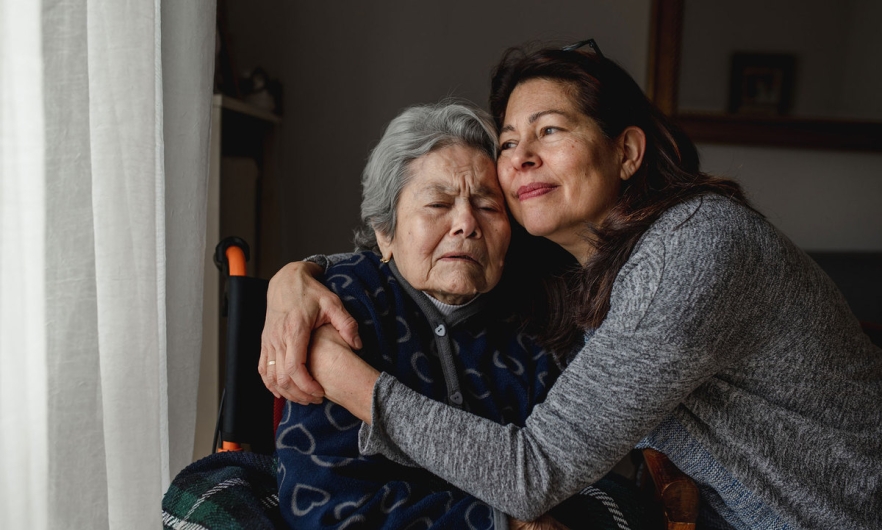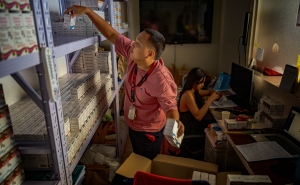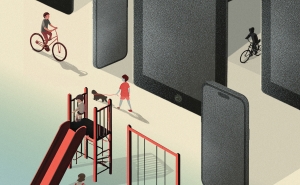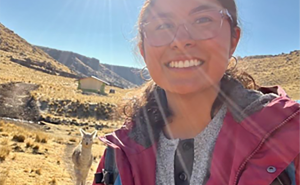Caregivers Need Care, Too
Experts on aging share guidance for caregivers supporting a loved one with Alzheimer’s disease or dementia.

An estimated 5.8 million people in the U.S. live with Alzheimer's disease and related dementias.
By 2060, that number is predicted to rise to 14 million, with Hispanic and African American populations being most affected.
Did you know:
- More than 90% of community-living adults 65 and older with Alzheimer’s disease rely on the help of family and other unpaid caregivers.
- In 2021, caregivers of people with Alzheimer’s disease or other dementias provided an estimated 16 billion hours of informal (i.e., unpaid) assistance, a contribution valued at $271.6 billion.
- The median caregiving time frame is about five years and may span an extended period, reflecting the long course of illness.
Unpaid caregivers experience their own emotional, physical, and financial impacts, but there are ways to mitigate them and ensure that these caregivers are equipped to support their loved ones throughout their illness.
Get Educated
If someone you care about has been diagnosed with Alzheimer’s disease, learn as much as you can. The more you know about the disease and available resources, the more confident you will feel navigating conversations and care.
“Education is a foundational element in supporting caregivers of persons with dementia by helping them understand the disease, obtain skills and knowledge to effectively respond to symptoms of the disease, and become familiar with resources and supports that are available,” says Jennifer Wolff, PhD, MHS, director of the Roger C. Lipitz Center for Integrated Health Care.
You don’t have to learn everything all at once. “Caregiver education works best when it’s tailored to meet specific needs and concerns,” Wolff says, noting that there is a range of modalities—print, video, online, in-person—through which you can learn over time.
Start by checking out the Administration for Community Living’s Aging and Disability Resource Network and the Alzheimer’s Association, both of which can help connect you to local resources and support.
Make Decisions Together
Discussing an Alzheimer’s diagnosis and what lies ahead can be difficult, and it is important to understand your loved one’s goals of care and preferences for the future. Does the person want to age in their own home? What if that’s not possible? The Conversation Project offers step-by-step guidance for how to have these conversations and what to ask, including a guide specific for caregivers for people with Alzheimer’s disease or dementia.
The earlier you talk honestly together about their desires and concerns—around things like treatment, information sharing, end-of-life care—the more prepared you will feel when the time comes to make decisions. Involving a lawyer or legal expert can help you navigate discussions around finances and assets and any documents associated with them.
Build Your Network
Family caregivers and care partners—often a spouse or child—may feel they need to do everything or may be hesitant to ask for or accept help. In fact, both the person living with dementia and their caregivers and care partners benefit from a broader support system. Caregivers can also find strength in sharing their experiences with other caregivers, which can in turn help others caring for loved ones with Alzheimer’s disease or dementia.
“It takes a village to run, or even hobble, the marathon that is dementia caregiving,” said Halima Amjad, MD, MPH, a geriatrician and researcher at the Johns Hopkins Memory and Alzheimer’s Treatment Center during a webinar for dementia caregivers. Amjad helped care for her own father with dementia. “For my family, our village included immediate and extended family, some paid caregivers, both my mom and my dad’s doctors, and some Facebook support groups that were specific to frontotemporal dementia.”
Organizations including the Alzheimer’s Association and Family Caregiver Alliance help connect caregivers with both in-person and online support groups.
Take Care of You
A person may live with Alzheimer’s disease for years and even decades, and caregiving can be especially demanding and challenging as the disease progresses. But it is important to not lose sight of one’s own well-being.
“You can’t give what you don’t have,” emphasizes Wolff. “That’s especially true in helping someone suffering from impaired memory, judgment, and thinking. You have to take care of yourself.”
In addition to maintaining a healthy diet, exercise, and sleep habits, it is important that caregivers stay engaged in the activities and relationships they find meaningful. “This can include getting together with friends and family, volunteering, or staying engaged in one’s faith community to stay connected to others and retain a sense of self and purpose,” explains Wolff.
Find Respite
Respite allows caregivers the flexibility to take a few hours, days, or even weeks to rest and rejuvenate while their loved one continues to receive the care they need. Caregivers should not feel guilty about seeking this type of support—research shows that respite makes you a better caregiver.
“It can be difficult to line up adult day or paid care,” says Wolff. “Therefore, it is helpful to plan for respite so that it is easier to activate when needed.” Knowing what respite options are available can be critical in the case of an emergency.
Here are a few resources for caregivers in the U.S.:
- ARCH National Respite Network’s Respite Locator
- Veterans Affairs Caregiver Support Program (all VA-enrolled veterans are eligible for respite services)
- Alzheimer’s Association (includes information on financial assistance and a community resource finder)
- Dementia Care Central’s Respite Guide
Caring for a loved one with Alzheimer’s or dementia can feel challenging, unpredictable, or isolating, but it also brings the potential for moments of joy, love, and connection. “When possible, focus on the positive, be creative, and make memories,” encourages Amjad.
Recommended Resources for Caregivers:
- The Alzheimer’s Association (also available in Spanish)
- The Family Caregiver Alliance
- National Institutes on Aging
- The Johns Hopkins Alzheimer’s Disease Research Center
- The Administration for Community Living
- The Conversation Project
Aliza Rosen is a digital content strategist at the Johns Hopkins Bloomberg School of Public Health.
RELATED:
More from the Bloomberg School
- See latest headlines
- Learn more about our departments:





